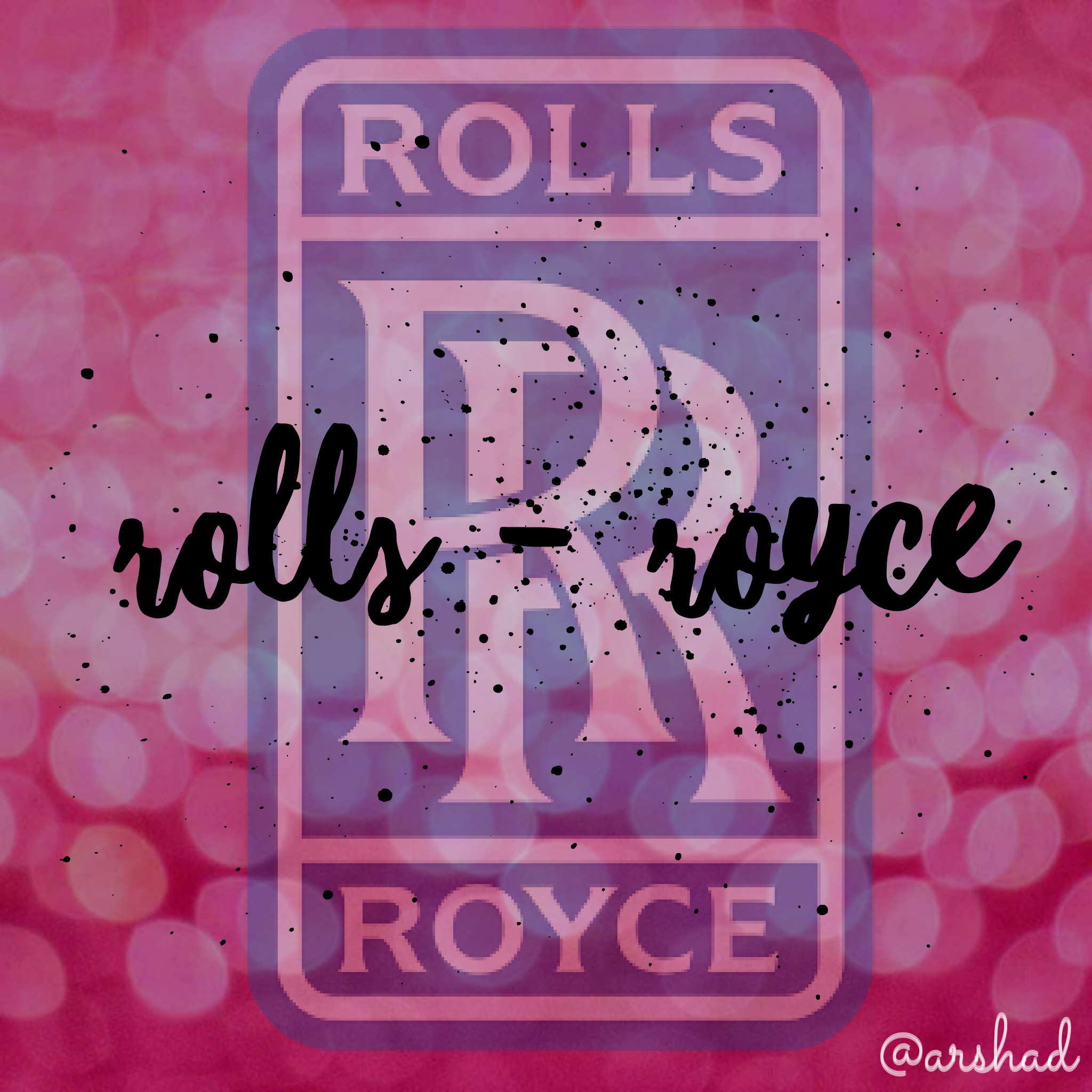The history of Rolls-Royce

History of Rolls-Royce
More than six out of ten of Rolls-Royce Motor cars built are still roadworthy The Rolls-Royce radiator grille is made entirely by hand and eye- no measuring instrument are used. It takes one man one day to make a Rolls-Royce radiator, and then five hours are spent polishing it During the first world war Rolls-Royce made rifles A Rolls-Royce does not break down .It `fails to proceed’.
Notices have been hung around the factory bearing be legend: `Beware silent cars.’ Event today every Rolls-Royce engine is completely hand built The cooling capacity of the air-conditioning system in the silver spirit is equivalent to that of 30 domestic refrigerators No one is certain who designed the Rolls-Royce radiator grille or the interlinked RR badge The oldest known Rolls-Royce still on the road is the 1904 10hp.
Sir Henry Royce’s first job was a newspaper delivery boy for W H Smith & Son Ltd.

1884
- Rolls-Royce grew from the electrical and mechanical business established by Henry Royce.

1904
- Royce built his first motor car.
- In May of that year met Charles Rolls, whose company sold quality cars in London.
- Agreement was reached that Royce Limited would manufacture a range of cars to be exclusively sold by CS Rolls & Co.
- They were to bear the name Rolls-Royce.
 1906
1906
- Success with the cars led to the formation of the Rolls-Royce company in March.
- The launch of the six-cylinder Silver Ghost.
- Silver Ghost was hailed as 'the best car in the world'.
- At the start of the First World War, in response to the nation's needs, Royce designed his first "aero engine – the Eagle ".
- The Eagle powered the first direct transatlantic flight.
 1914
1914
- At the start of the First World War, in response to the nation's needs, Royce designed his first "aero engine – the Eagle ".
- The Eagle powered the first direct transatlantic flight.
 1931
1931
- Rolls-Royce develop the 'R' engine to power Britain's entry in the International Schneider Trophy seaplane contest.
- It established a new world air speed record of over 400mph in 1931.
- It established new world records on both land and water.
- Rolls-Royce gave the technological base to develop the Merlin.
 1940
1940
- The Merlin powered the Hawker Hurricane and Supermarine Spitfire in the Battle of Britain.
- Demand for the Merlin during the Second World War transformed Rolls-Royce from a relatively small company into a major contender in aero propulsion.
 1944
1944
- Rolls-Royce began development of the aero gas turbine, pioneered by "Sir Frank Whittle".
- The Welland engine entered service in the Gloster Meteor fighter.
- Rolls-Royce had the confidence immediately after the war to commit itself to the gas turbine, in which it had a technological lead.
 1953
1953
- Rolls-Royce entered the civil aviation market with the Dart in the Vickers Viscount.
- It was to become the cornerstone of the universal acceptance of the gas turbine by the airline industry.
- The Avon-powered Comet became the first turbojet to enter transatlantic service.
 1959
1959
- The other major manufacturers in Britain between the wars were Armstrong Siddeley, Blackburn, Bristol, de Havilland and Napier.
- capability of the British aero-engine industry was consolidated when Rolls-Royce and Bristol Siddeley.
 1960
1960
- The Conway engine in the Boeing 707 became the first turbofan to enter airline service.
- Rolls-Royce launched the RB211 for the Lockheed L-1011 Tri-Star.
 1971
1971
- Early problems with the RB211 led to the company being taken into state ownership.
- The three-shaft turbofan concept of the RB211 established itself at the heart of the Rolls-Royce world-class family of engines.
 1987
1987
- Rolls-Royce returned to the private sector, undergoing a number of mergers and acquisitions.
- Rolls-Royce became the only company in Britain capable of delivering power for use in the air, at sea and on land.
 1990
1990
- Rolls-Royce formed an aero engines joint venture with BMW of Germany.
- The legal name of the company is now Rolls-Royce Deutschland Ltd & Co KG.
 1995
1995
- Allison Engine Company in Indianapolis was acquired.
- Allison brought with it major new civil engines including the AE3007 for Embraer's new regional jet, and existing.
- Successful defence programmes were made.
 1998
1998
- Rolls-Royce Motor Cars was sold by Vickers to Volkswagen.
- Although BMW hold the rights to the name and the marque for use on Rolls-Royce cars, having acquired the rights from Rolls-Royce plc for £40m.
 1999
1999
- Rolls-Royce took full control of its oil and gas joint venture, Cooper Rolls, with the acquisition of the rotating compression equipment interests of Cooper Energy Services.
- It acquired National Airmotive in California, a major repair and overhaul facility now part of Rolls-Royce Engine Services.
 2004
2004
- Rolls-Royce celebrated its centenary throughout 2004 with a series of special events for customers, partners from education and industry, as well as employees, families and friends in the UK, Germany, Scandinavia North America and the Far East.
 2005
2005
- Rolls-Royce opens its 6,000 square metre Marine facility in Shanghai. Located in the Nanhui industrial zone in Shanghai, the facility is equipped with specialised machinery and a 200-strong workforce, including a growing team of service engineers.
- The revolutionary tiltrotor aircraft known as the V-22 Osprey went into its first operational use with the US Marine Corps.
 2006
2006
- The only engine designed specifically for the Boeing 787 Dreamliner is the Rolls-Royce Trent 1000.
 2007
2007
- The MT30 marine gas turbine is selected to power the US Navy’s first two DDG-1000 multi-mission destroyers.
- Rolls-Royce Trent 900 was the first engine to power the Airbus A380 into service with Singapore Airlines.
- The A380 is the world’s largest airliner and has four engines per aircraft.
 2009
2009
- The decision to build a large-engine assembly plant and a new wide-chord fan blade factory in Seletar, Singapore, was announced, the first of these to be built outside the UK.
- Rolls-Royce celebrated the first flight of six of its customers’ aircraft: the Boeing 787; Gulfstream G650; Airbus A400M; Embraer Legacy 650, the BAE Systems Mantis UAV and the AgustaWestland Lynx Wildcat helicopter.
- Rolls-Royce marine power saw the US Navy’s Littoral Combat Ship go on active duty, the first sailing of the Royal Navy’s Astute class submarine and the commissioning of the Royal Navy’s first Type 45 Destroyer, HMS Daring.
 2010
2010
- The engine for the Airbus A350 XWB, ran for the first time in June. At this point 1,150 Trent XWB engines are already on order promising to make the Trent XWB the most successful member of the Trent family.
- Rolls-Royce’s naval business secured a breakthrough order from the US Navy to power 10 Littoral Combat Ships with MT30 marine gas turbine engines.
- Early in 2010, the short take-off and vertical landing (STOVL) version of the F-35 Joint Strike Fighter deployed the unique Rolls-Royce LiftSystem® for the first time.
 2011
2011
- The Rolls-Royce Trent 1000 is the first engine to power Boeing 787 Dreamliner, which went into service on 26 October 2011 with All Nippon Airways (ANA).
- The 1,000th production Rolls-Royce Trent 700 engine is delivered to Cathay Pacific in November.
- In May 2011, the UK Government awarded Rolls-Royce the contract to develop a new propulsion system for the next generation of nuclear-powered submarines.
 2012
2012
- The short take-off and vertical landing (STOVL) variant of the F-35B Lightning II Joint Strike Fighter entered service with the US Marine Corps and deliveries were made to the UK MoD.
- The Apprentice Academy opened in Rolls-Royce, Derby, on the 2nd November 2012, equipped with workshops containing the very latest machines, tooling and software to help train the high-class engineers of the future.
 2013
2013
- The Trent XWB engine takes to the skies for the first time on an Airbus A380 test aircraft in Toulouse, France. The aircraft flew with one of its four Trent 900 engines replaced by the Trent XWB.
- Tognum, which makes MTU high-speed reciprocating engines becomes part of Rolls-Royce under the name Rolls-Royce Power Systems.
Hope you like this give this a upvote. FOLLOW - @arshad for more
-THANK YOU
waaooo great history and nicely presented... :)
Thank you
Congratulations! This post has been upvoted from the communal account, @minnowsupport, by OSM! Arshad from the Minnow Support Project. It's a witness project run by aggroed, ausbitbank, teamsteem, theprophet0, and someguy123. The goal is to help Steemit grow by supporting Minnows and creating a social network. Please find us in the Peace, Abundance, and Liberty Network (PALnet) Discord Channel. It's a completely public and open space to all members of the Steemit community who voluntarily choose to be there.
If you like what we're doing please upvote this comment so we can continue to build the community account that's supporting all members.
Thank you